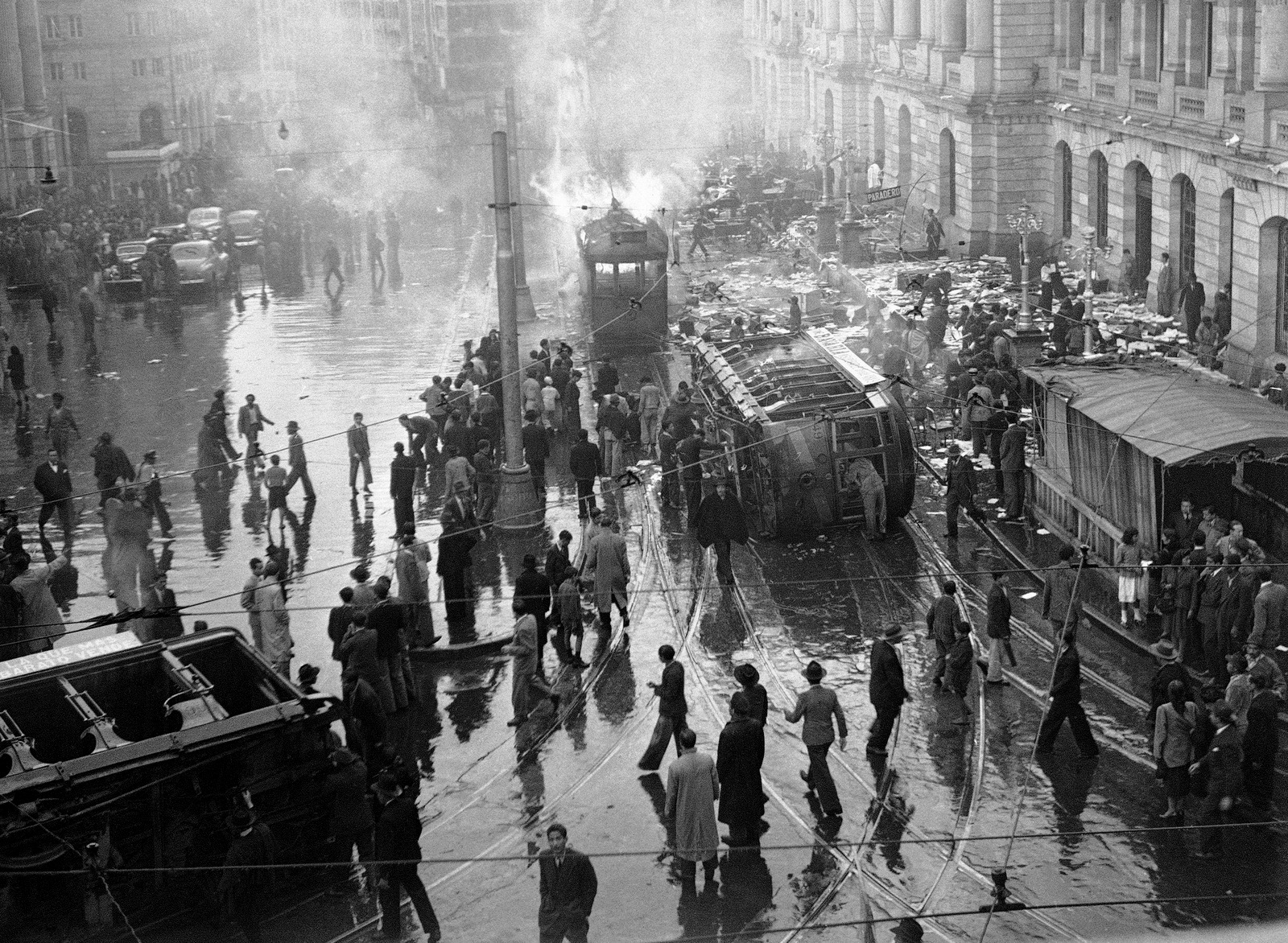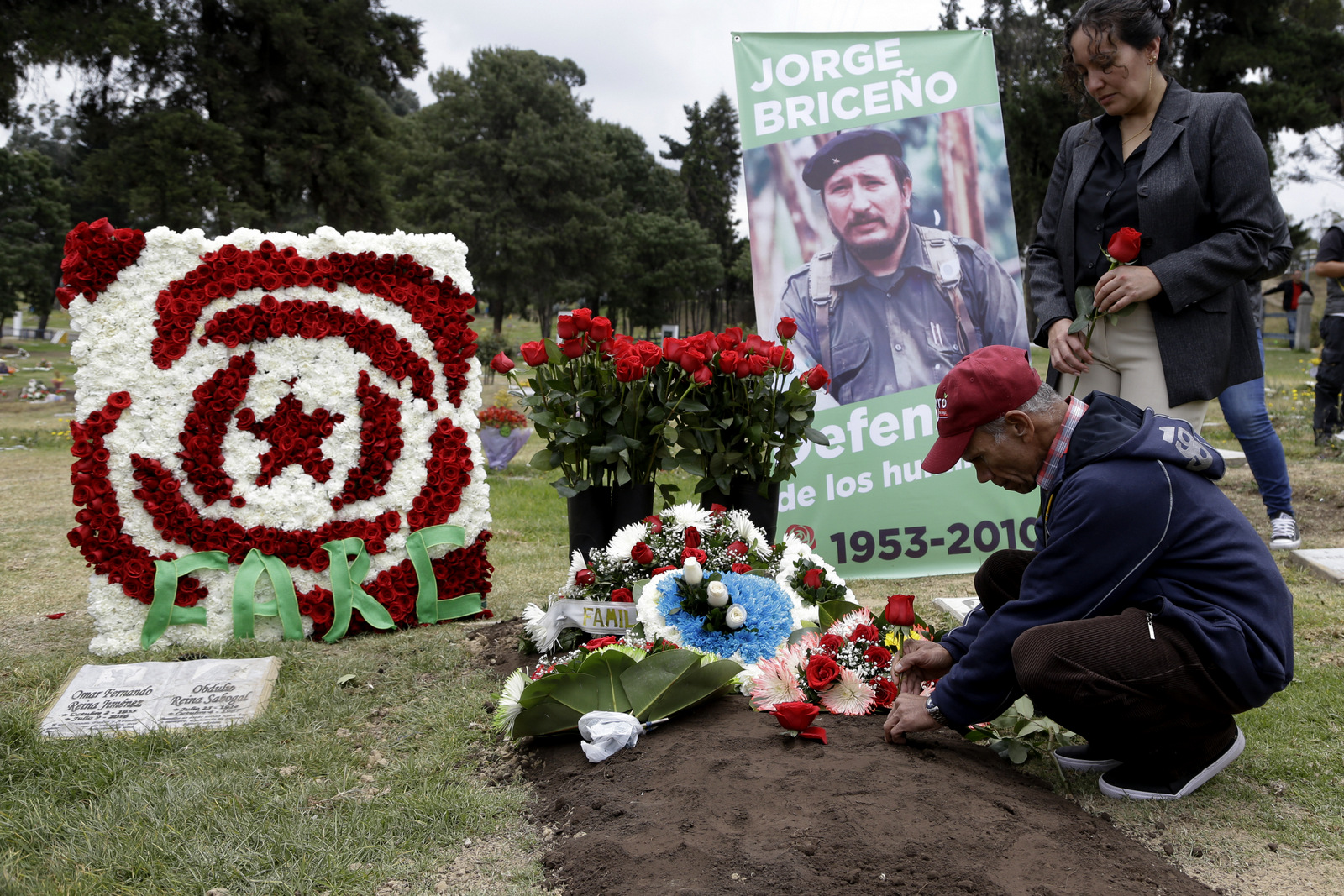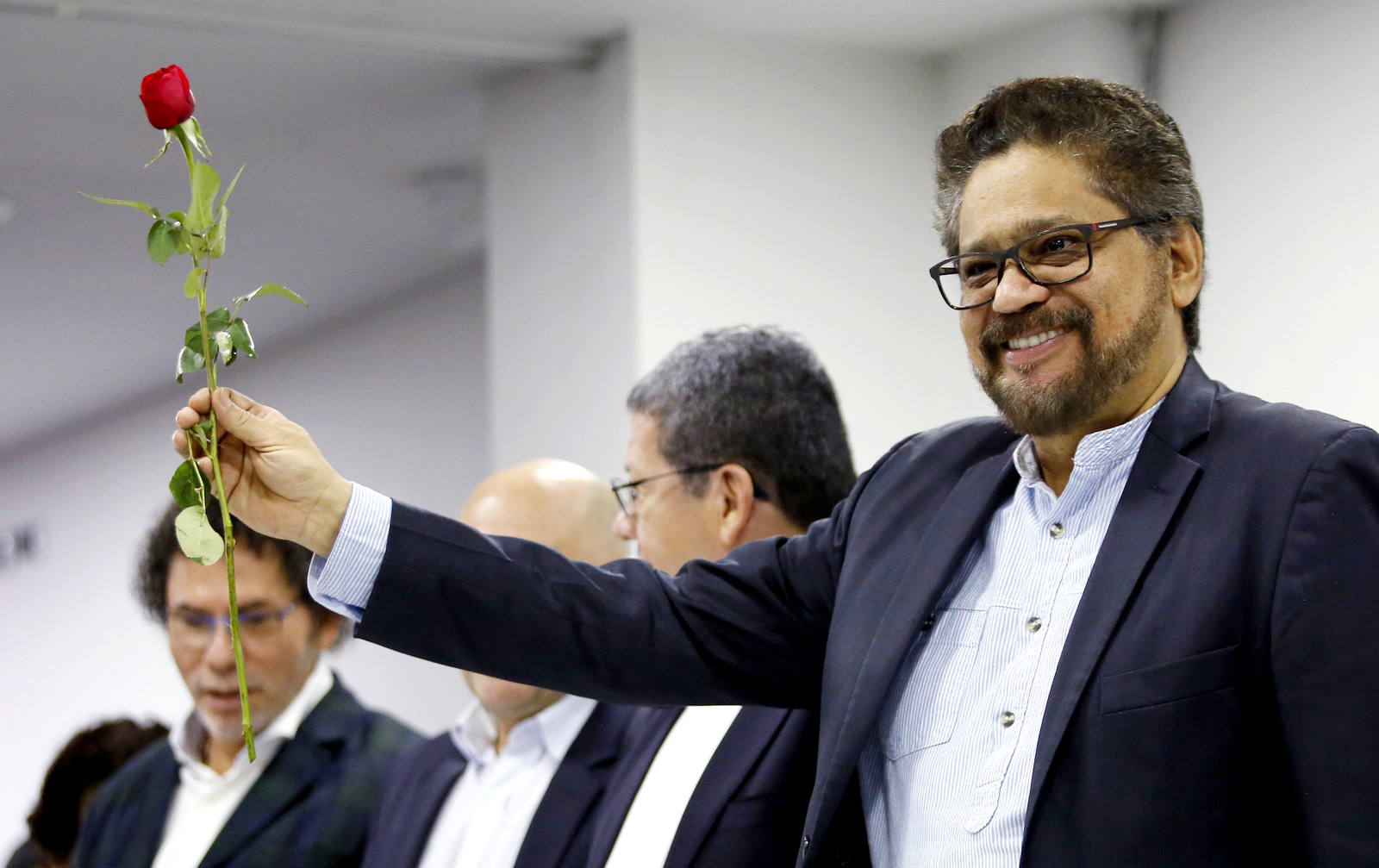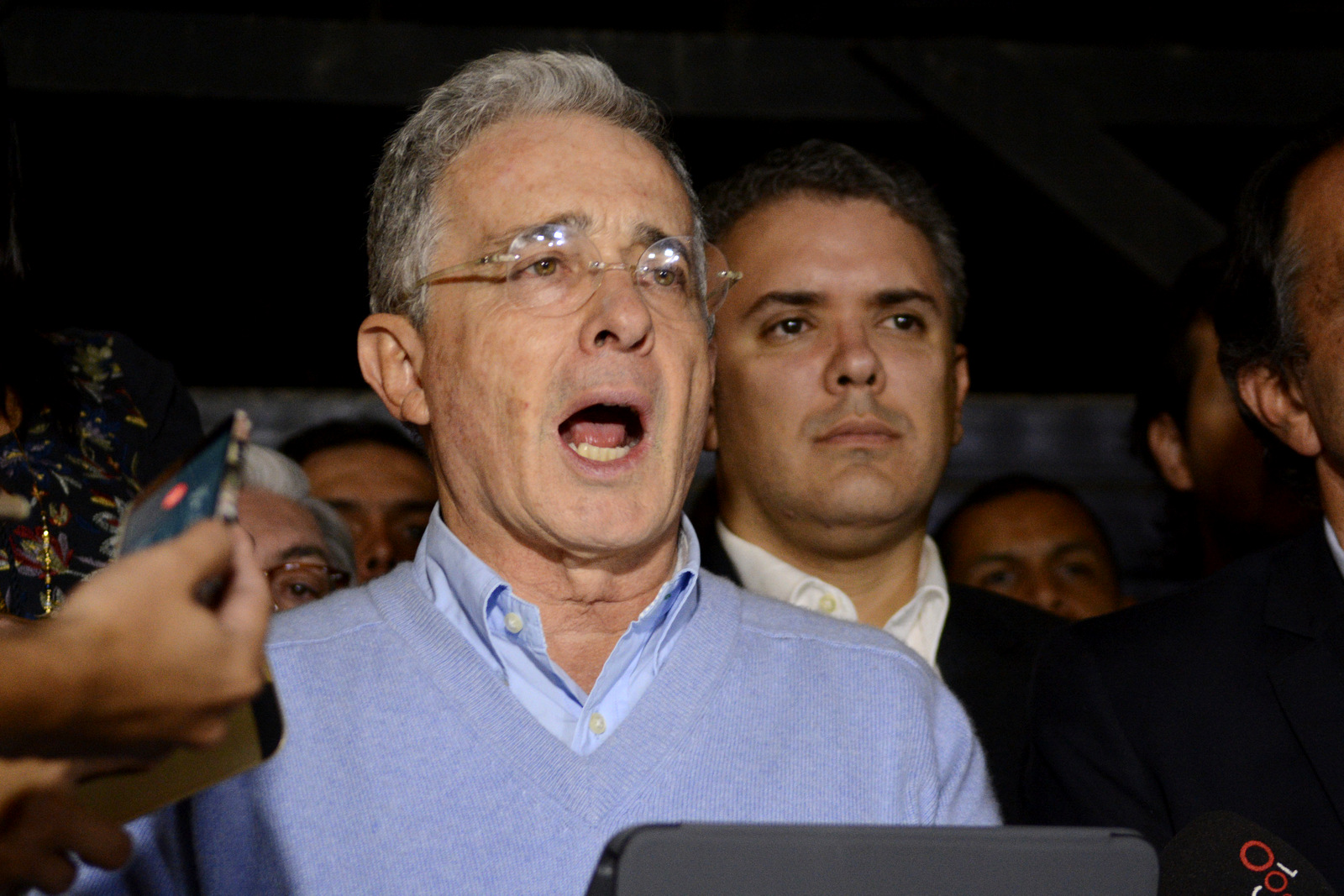BOGOTA, COLOMBIA — With Colombia’s March 11 legislative elections ending in a near tie between right- and left-wing coalitions, the future of an already precarious peace process most likely hinges on the May 27 presidential vote.
When far-right uribista Ivan Duque of Centro Democratico (Democratic Center) squares off against left-leaning former Bogota mayor Gustavo Petro, it will determine the trajectory of the close U.S. ally, and whether or not the most recent attempt at peace might continue.
With the candidates nearly tied in polls, Colombia’s future remains uncertain.
What is certain however, is that for a century, Colombia’s oligarchy has stopped at nothing to dismantle worker and peasant organizing. Although Colombians want peace, is it possible in such a situation?
Famously fictionalized but eternally real in Gabriel Garcia Marquez’ seminal One Hundred Years of Solitude, the Colombian military, with the support of the United States, massacred thousands of United Fruit Company banana workers in 1928 for striking.
Today, the political dynamic is largely the same. Names and methods may have changed, but not by much. United Fruit Company is now Chiquita, but the latter, along with Coca-Cola and Dole, was found guilty of funding campesino-murdering paramilitaries as recently as 2004. Nobody served jail time.
The deep roots of violence and class war in Colombia

A street car is overturned and burned during an uprising following the assassination of Jorge Eliecer Gaitan in Bogota, Columbia. The 1948 assassination of Gaitan sparked the political bloodletting known as “La Violencia,” or “The Violence.” (AP/E. L. Almen)
Colombia’s 2016 peace agreement, for which outgoing center-right President Juan Manuel Santos won a Nobel Prize, has been widely praised internationally. As a result of the deal, Latin America’s oldest leftist guerrilla organization, the former Revolutionary Armed Forces of Colombia (FARC), is now a legal electoral party, the Revolutionary Alternative Forces of the Commons (also FARC).
But has this peace truly managed to transform the roots of the country’s violence? Since the FARC’s demobilization, hundreds of social leaders, including trade unionists, campesino leaders, and coca farmers have been brutally murdered. Demobilized FARC members have also been targeted, with around 56 people affiliated with the former guerrilla organization turned political party having been killed since so-called “peace.”
Paramilitary violence in Colombia has deep roots. To learn more, MintPress spoke with Professor Oliver Villar, author of Cocaine, Death Squads, and the War on Terror: U.S. Imperialism and Class Struggle in Colombia, published by Monthly Review Press.
Asked about the origins of paramilitary violence in Colombia, Villar explained:
Paramilitary violence against leftists is part of Colombia’s long and deep history of class warfare. We can go back to the Wars of Independence against Spain, but the modern structures of paramilitary terror are traceable to La Violencia (1948-58), when Conservatives set up death squads to assassinate their political opponents the Liberals, as well as Communists who took up arms against the State.”
It was this context that led to numerous groups consisting of peasants, workers, students and intellectuals — inspired to varying degrees by Marxism, the successful Cuban revolution, and liberation theology — taking up arms against state and paramilitary forces. Villar tells us:
This violent history produced one of the most reactionary ruling classes in Latin America but also one of the most effective and enduring forms of resistance since the mid-20th century. As a result of this class war, was the creation of a number of Marxist insurgencies throughout the 1960s; the most formidable were the FARC-EP and ELN [National Liberation Army]. For over half a century, this insurgency has existed in a virtual parallel universe, surviving the Cold War and surviving the so-called ‘War on Terror.’”
Colombia’s state was not acting without foreign support. As a resource-rich, geopolitically strategic country, the United States has long seen the “security” of Colombia as key to its own interests. Villar argues that the U.S. has long been the “main sponsor” of state violence:
Since the Kennedy administration identified the insurgency as being a greater threat than the Vietcong, the U.S. has funded, trained and supported the Colombian State in its war against leftists. In 2000, President Clinton introduced ‘Plan Colombia,’ which was promoted as a ‘war on drugs’ but was in fact a counterinsurgency program to eliminate the largest militant left-wing force – the FARC.”
Plan Colombia — implemented by the Clinton administration, but largely executed under the Bush administration through the cooperation of far-right former Colombian president, Alvaro Uribe Velez, who founded the Centro Democratico party — saw over $10 billion flow into the South American nation.
It is often claimed by observers that Colombia never experienced the periods of military dictatorship that swept Latin America in the 1970s and 80s, but Villar strongly disagrees:
Ex-president Alvaro Uribe Velez is up there with America’s hard hitters: Videla, Pinochet, Fujimori and so on.”
This hasn’t stopped Uribe from remaining one of the most influential and well-connected Colombian politicians internationally. To this day, he regularly travels to the U.S. for speaking engagements at elite universities, and is praised by his friends in the North for his supposed “success” in the “war on drugs.”
Bolstered by U.S.-derived money, Uribe’s terms in office oversaw a dramatic rise in assassinations carried out by state forces. The United Nations even acknowledges that, during his two terms, thousands were murdered by military and police, with the crimes often covered up by disguising bodies as FARC combatants, or blaming the killings on drug traffickers or guerrillas.
WikiLeaks documents have demonstrated a clear connection of Uribe’s “citizen informant” and “convivir” security programs with illegal paramilitary groups. Right-wing politician German Vargas Lleras recently claimed in a Tweet that these programs should be revived.
Reviviremos los frentes locales de seguridad y crearemos un cuerpo de voluntarios en seguridad ciudadana para contribuir al monitoreo cuadras y barrios, la reconciliación y la convivencia.
— Germán Vargas Lleras (@German_Vargas) February 5, 2018
Translation | We will revive the local security fronts and create a body of volunteers in citizen security to contribute to the monitoring of blocks and neighborhoods, reconciliation and coexistence.
Uribe and his family have faced and continue to face numerous investigations into paramilitary ties, with accusations brought forward by left-leaning politicians Gustavo Petro and Ivan Cepeda. In February, a court in Medellin ordered an investigation into Uribe for his alleged role in paramilitary massacres as long ago as the 1990s. Shortly after, Colombia’s Supreme Court called a further investigation on suspicion that Uribe had falsified evidence and manipulated witnesses in the cases against him.
A precarious “peace”

A man places flowers on the grave of slain rebel leader Jorge Briceno, known as Mono Jojoy, during an homage of former members of the Revolutionary Armed Forces of Colombia, FARC, at a cemetery in southern Bogota, Colombia, Sept. 22, 2017. Briceno was killed by the Colombian Army on Sep. 22, 2010. (AP/Ricardo Mazalan)
While the FARC has held up its end of the peace deal, having successfully handed over its weapons to the United Nations last year and registered as a legal political party, ongoing violence shows that the social conditions that cultivated armed struggle are still very much in place.
Although the state claims paramilitaries have demobilized, the “armed groups” continuing to operate consist of largely the same actors as always, hailing from criminal drug and illegal mining sectors. Gimena Sanchez — the Andes director at Washington Office on Latin America (WOLA), who tracks U.S. policy in Colombia — told MintPress News:
The Colombian government tries to say it’s organized crime, then they called them illegal armed groups … that tries to depoliticize their role. The reason that Colombia doesn’t want them to be called paramilitaries is because that implies collusion with the state.”
Sanchez, who has spent time in the Choco region of Colombia, described how she had observed how one of Colombia’s most notorious paramilitary groups of the Uribe years, the United Self-Defense Forces of Colombia (AUC — now-demobilized), evolved from its “pre-incarnations,” through its eventual demobilization and disintegration into various other “criminal groups.”
“I can say in that region (Choco), the names have changed, but they are the same people,” Sanchez said.
Peace with guerrillas had been tried before in Colombia, and ended in tragedy. When the FARC’s previous electoral project, Marcha Patriótica, enjoyed significant electoral success in 1986 with a land-reform platform, it provoked the ire of Colombia’s landed interests and criminal networks. In the 1980s and 1990s, paramilitaries massacred thousands of Marcha Patriótica members, destroying the party and reigniting war. The party wasn’t able to reconstitute as an entity distinct from the FARC until 2013, a ghost of what it could have been, haunting all subsequent efforts at peace.
Trading guns for roses

Ivan Marquez holds a red rose, the symbol of the new political party Alternative Communal Revolutionary Forces, during a press conference in Bogota, Colombia, Sept. 1, 2017. (AP/Fernando Vergara)
The electoral road has not been easy for the FARC this time around. As an electoral party with a new “rose” logo, they failed to win any more than the 10 legislative seats they were already guaranteed in the peace agreement. Ongoing health problems, as well as near constant threats of violence, forced FARC leader, Rodrigo “Timochenko” Londoño, to withdraw his presidential campaign.
But while mainstream media claim that the FARC’s difficulties as a legal party are a “rejection” of the former guerrillas by the Colombian people, the FARC’s leaders say that the lack of guarantees promised them in the peace deal has made their electoral efforts to reach the Colombian people difficult to impossible.
Londoño wrote in a March blog post:
The party of the commons won in spite of the obstacles and impediments, in spite of the propaganda war, and very much in spite of the deaths among us, because we have persisted in the political space won during decades of heroic struggle.”
International and national opinion recognizes the threats, aggressions, and violent actions organized against our candidates by representatives of the Centro Democratico. No heart but mine resisted the suspension of our campaign more, with the consequences it would have. But without the support of the State, without electoral machines, without clientelism, without money, without corruption, with the ‘media of mass destruction’ against us, facing dirty campaigns, but armed with love, honesty, and conviction, of course we are victors.”
The FARC — attempting to combat a negative perception among some in the cities cultivated by years of media coverage portraying them as terrorists — have been met with protests at their campaign rallies, which they say are provoked by right-wing uribista groups.
Following the legislative elections on March 11, the FARC released a statement denouncing the fact that they were prohibited from opening a bank account to access the campaign money to which they were legally entitled.
Reports of vote fraud also emerged, something that has been claimed by many political actors and observers.
Still, the FARC is optimistic, and has said that “in spite of great difficulties faced,” they will use their 10 senate seats to forge alliances with progressive forces, secure the peace agreement, and work toward reforming an outdated and broken electoral system. Newly elected FARC senator Pablo Catatumbo tweeted:
Nuestra acción parlamentaria se centrará en las reformas pendientes para la implementación del Acuerdo de Paz y en proyectos legislativos que mejoren las condiciones de vida de las mayorías. ¡Ejerceremos a plenitud la función de control político! https://t.co/vpWTiWwGPS
— Pablo Catatumbo (@PCatatumbo_FARC) March 13, 2018
Translation | Our parliamentary action will focus on the pending reforms for the implementation of the Peace Agreement and on legislative projects that improve the living conditions of the majorities.
Most significantly however, the FARC has assured that their project will not limit itself to the electoral realm:
With the understanding that we don’t exclusively define ourselves as an electoral party, we express our desire and firm intention to be with the social and popular struggles in all parts of our country; we will be present in just causes of protest, and the mobilization of the people of the common, and support the dynamic constituents that generate social and popular movements.”
In spite of their optimism, the withdrawal of Londoño from the campaign and their difficulties in finding their footing electorally without the proper guarantees from the State represent another major threat to the precarious peace. Many observers argue that the ball is in the Santos government’s court to ensure that their peace project doesn’t dissolve through a loss of trust.
WOLA’s Sanchez told MintPress:
If it (the government) doesn’t implement the provisions related to land, truth, justice and political plurality, as well as the programs designated for the coca farmers, it won’t be too long before new armed groups confront the state.”
Uribe’s return?

Former President Alvaro Uribe, flanked by presidential candidate Ivan Duque, reads a statement at his house in Rionegro, Colombia, Oct. 2, 2016. (AP/Luis Benavides)
When Juan Manuel Santos, a former defense minister under Uribe, took the presidency, it split Colombia’s oligarchy in two between those who wanted to try for peace with the FARC, and those who, in Villar’s words, want to “finish what they started.”
The uribista camp has remained a strong political force, opposing a peace deal from the beginning, while Santos and his allies who ranged across the political spectrum negotiated the eventual disarmament of the FARC in exchange for immunity and legal political participation.
Under the Obama administration, the U.S. Congress promoted the peace agreement under bipartisan consensus, and renamed the Plan Colombia program “Paz Colombia.”
Villar argues:
The government of Juan Manuel Santos represents the modern bourgeoisie, the agro-mineral and financial classes, urban and cosmopolitan, closely intertwined with the interest of U.S. finance capital, which was strongly supported by Obama. Uribe and the “extreme right” represent the narcobourgeoisie who fought the war with paramilitary death squads.”
The extreme-right “narcobourgeoisie” forces behind Uribe could see a return in May 27 elections, should the Centro Democratico’s candidate, Ivan Duque, assume the presidency.
Camilo Gonzalez, the director of the Institute for Studies of Development and Peace (Indepaz), said in a statement recently:
With the tie in the composition of the Congress of the Republic, the fate of the peace accord implementation depends on the results of the presidential elections.”
Presidential candidate Ivan Duque, who is neck and neck with Gustavo Petro, has opposed the peace process every step of the way, and refuses to acknowledge the FARC as a legitimate political party, saying he “doesn’t like giving prizes to criminals.”
In an interview with Colombian paper El Pais, Duque said:
There are legal issues involving the impunity in this country for FARC criminals; our agenda includes dealing with criminal drug gangs, with the rise in illicit crops, and with the ELN guerrilla. For that, the state will need a great capacity for offensive and deterrence action.”
A return to uribismo could also be reflective of a shift in the United States’ attitude under the Trump administration toward one that desires a yet more militarized Colombia to regionally counter Venezuela.
According to WOLA’s Sanchez, although the U.S. Senate is still largely supportive of peace and the Santos approach, the Trump administration has focused on two things: the drug war, and Colombia’s socialist neighbor Venezuela. Trump may be taking more cues from Senator Marco Rubio (R-FL), who is close with Uribe.
Rubio has recently been highly critical of Trump’s pick for Colombian ambassador, Joseph Macmanus — pushing for someone more hardline, who could enforce “America First” in Colombia — and criticized him during a Senate confirmation hearing on March 7. It remains unclear whether or not, at Rubio’s urging, Macmanus will join the ranks of the fired in Trump’s administration. Sanchez concluded:
Marco Rubio said in the hearing we have to protect Colombia from the threat of Venezuela. I think we’ll be hearing a lot more of this, that Colombia is a barrier for Venezuela. If history repeats itself, with another Uribe, you could see more tensions.”
Colombia regional positioning makes it geopolitically an important piece in the “America First” agenda. Villar argues:
Donald Trump has declared that the United States is facing growing competition from Russia and China, two great-power rivals which he says ‘seek to challenge U.S. influence, values and wealth.’ The Colombian question is vital to U.S. domination and, as Trump knows, ‘America is in the game,’ one that he thinks ‘America is going to win.’ But so is America’s main competitor in the region, China.”
With a campaign built on fear-mongering, that “castrochavismo,” an amalgam of Cuban and Venezuelan revolutionary leaders Fidel Castro and Hugo Chavez, will “destroy” Colombia, and a population apathetic toward the country’s politics (over 62 percent of Colombians abstained in 2016’s referendum on peace), Duque stands a chance at winning, putting the Santos peace deal at risk.
Perhaps only one thing is certain in Colombian politics at the moment: for Colombia’s poorest, peace is likely to remain only a fantasy of the wealthy while an entrenched oligarchy continues dismantling progressive aspirations, physically and ideologically, one century after those same reactionary forces massacred thousands so that those in the North could eat their cheap bananas.
Top Photo | Colombia’s former President Alvaro Uribe listens to a question during an interview in Bogota, Colombia. Colombian authorities have detained President Uribe’s younger brother Santiagowas charged with the creation of right-wing paramilitary groups during the 1990’s. (AP/Fernando Vergara, File)
The post On Brink of a Stable Peace, Colombia Faces Familiar US-Backed Right-Wing Elements Seeking to Subvert It appeared first on MintPress News.
